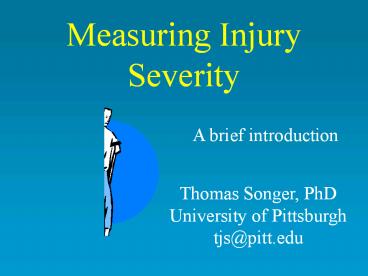Measuring%20Injury%20Severity - PowerPoint PPT Presentation
Title:
Measuring%20Injury%20Severity
Description:
Head or neck - Face. Abdominal - Chest. Extremities - External. INJURY SEVERITY SCORE ... Spinal cord. Thorax. Front of Neck. All other body regions. All others ... – PowerPoint PPT presentation
Number of Views:298
Avg rating:3.0/5.0
Title: Measuring%20Injury%20Severity
1
Measuring Injury Severity
A brief introduction
Thomas Songer, PhD University of
Pittsburgh tjs_at_pitt.edu
2
Degrees of Injury Severity
Injury Deaths
Hospitalization
Emergency Dept.
Physician Visit
Households
3
EMS
Police
Self-Treat
Emergency Dept.
doctor
Injury
Hospital
Morgue
Trauma Center
Rehab Center
Robertson, 1992
4
Major Areas of Application on Injury Severity
Indices
- Triage
- Prognostic Evaluation
- Research and Evaluation
5
Is there potential for improvement in the care of
injured patients?
6
Improvements in outcomes related to injury may be
achieved by
- Enhancing pre-hospital care
- Adopting ATLS principles
- Integrating trauma care within and between
hospitals - Investing in rehabilitation services
7
Measuring the Burden of Injuries
- Fatal
- Counts and rates
- Years of Potential Life Lost
- Non-fatal
- Short term
- Health care use
- Hospitalization rates
- Functional limitations
- Severity
- AIS
- RTS, etc
- Pathology
Segui-Gomez
8
Injury Severity Scales
9
Impact of the Injury will depend on...
- Extent of tissue damage
- Physiological response to the injury
- Host factors that mediate the response
10
Aspects of Injury Severity
Physiological Measurements
Anatomical Injury
Age Blunt/Penetrating
Probability of survival of individual patients
Comparisons between groups
11
INJURY SEVERITY Alphabet Soup
ASCOT
APS
IIS
CRAMS
ICISS
TRISS
ISS
APACHE
AIS
RTS
GCS
AP
12
Abbreviated Injury Scale (AIS)
- Anatomical measure that addresses the extent
of tissue damage - ICD-based classifications
13
AIS Severity Component
MINOR MODERATE SERIOUS SEVERE CRITICAL MAXIMUM
INJURY, VIRTUALLY UNSURVIVABLE
1 2 3 4 5 6
14
Severity scores are subjective assessments
assigned by expertsImplicitly based on four
criteria
- Threat to life
- Permanent Impairment
- Treatment Period
- Energy Dissipation
15
Addressing Multiple Injuriesfor predicting
survival
- Injury Severity Score (ISS)
- The New Injury Severity Score (NISS)
- The Anatomic Profile (AP)
16
The Injury Severity Score (ISS)
- Sum of squares of the highest AIS in each
- of 3 most severely injured body regions
- ISS Body Regions
- Head or neck - Face
- Abdominal - Chest
- Extremities - External
17
INJURY SEVERITY SCORE Example
-
AIS Score - Small subdural haematoma 4
- Parietal lobe swelling 3
- Major liver laceration 4
- Upper tibial fracture (displaced) 3
- ISS 42 42 32 41
18
Criticisms of the ISS
- Does not take into account multiple injuries
within a body system - Equal weights across body regions
underscores severe head injuries
19
The New Injury Severity Score (NISS)
- Sums of squares of the 3 highest AIS scores
regardless of body region
20
ISS vs. NISS - an Example
AIS Score Region
Multiple abrasions Deep laceration
tongue Subarachnoid hemorrhage Major kidney
laceration Major liver laceration
1 2 3 4 4
External Face Head/Neck Abdomen Abdomen
ISS (4)2 (3)2 (2)2 29 NISS (4)2
(4)2 (3)2 41
21
Anatomic Profile
22
Anatomic ProfileDefinition of Components
Component
AIS Region
AIS Severity
A B C D
3-6 3-6 3-6 3-6 3-6 1-2
Head/Brain Spinal cord Thorax Front of Neck All
other body regions All others
The square root of the sum of squares of AIS
scores is used to summarize a components injuries
23
ICD to AIS Conversion(ICDMAP)
- Converts ICD-9CM coded discharge diagnoses into
AIS scores and computes ISS, NISS, APS - Conservative measure of injury severity - refer
to as ICD/AIS scores
24
Injury Severity Scales
- In Use
25
Evaluating System Performance
- Using hospital discharge data, classify patients
according to where they should have been treated
(based on AIS severity) - Compare where they should have been treated to
where they actually were treated
26
Percent of ISS gt 16 Patients Getting to Trauma
Centers
- Metro Area A 55
- Metro Area B 59
- Metro Area C 66
- Metro Area D 68
- Metro Area E 73
- Metro Area F 78
- Metro Area G 85
27
Physiologic Response
- Glasgow Coma Score
- Revised Trauma Score
28
Glasgow Coma Scale
- Head injuries vary as to severity ranging from
mild, moderate, to severe - The Glasgow Coma Scale is a measure of this
severity - The GCS is assessed immediately following the
injury and during the initial recovery
29
Glasgow Coma Scale
Parameter
Response
Score
Nil
1
Eye opening
To pain
2
To speech
3
Spontaneously
4
Nil
1
Extensor
2
Motor response
Flexor
3
Withdrawal
4
Localising
5
Obeys command
6
Nil
1
Groans
2
Verbal response
Words
3
Confused
4
Orientated
5
30
Revised Trauma Score
- - a physiological measurement
- - based on data at arrival to hospital
- considers
- Respiratory rate
- Systolic blood pressure
- Glasgow Coma Scale
31
Revised Trauma Score
Category
Score
Clinical Parameter
x weight
10-29
4
gt29
3
Respiratory rate
(Breaths per minute)
0.2908
6-9
2
1-5
1
0
0
gt89
4
Systolic blood
76-89
3
Pressure
0.7326
50-75
2
1-49
1
0
0
13-15
4
Glasgow Coma
9-12
3
Scale
0.9368
6-8
2
4-5
1
3
0
32
Assessing RTS may be problematic
- Accurate GCS and RR difficult when the patient is
intubated, chemically paralyzed or under the
influence of drugs or alcohol
33
Host Factors
- Age
- Pre-existing conditions
- Other
34
Combining information on
- Tissue damage
- Physiologic response
- Host factors
35
Probability of Survival Models
- TRISS
- ASCOT
36
Further Improvements
37
Refining the State of the Art
- 1. Further refine the AIS and RTS
- 2. Revisit Probability of Survival Models --
especially for population based data - 3. Better delineate role of host factors
38
AIS BASED MEASURES of IMPAIRMENT
- Injury Impairment Scale (IIS)
- Functional Capacity Score (FCI)































